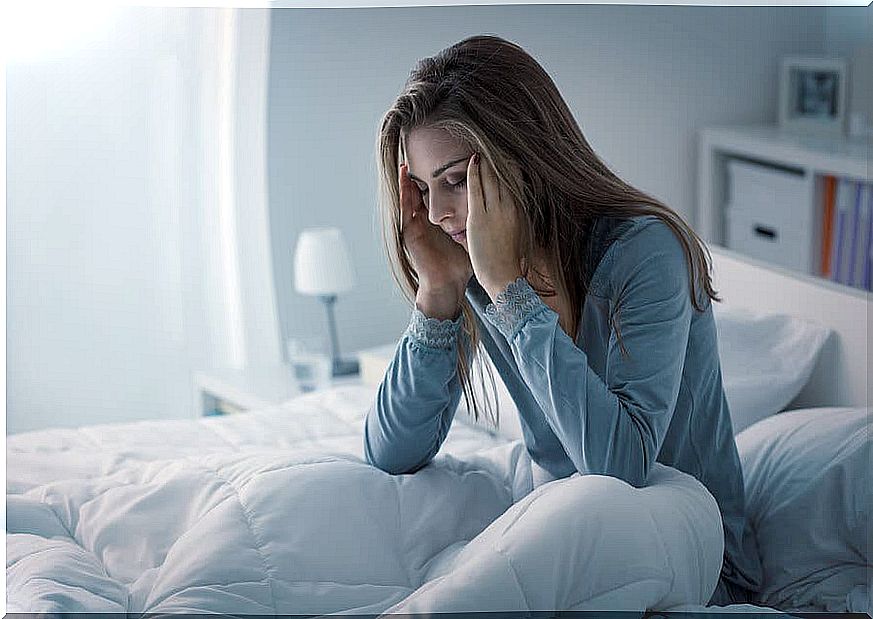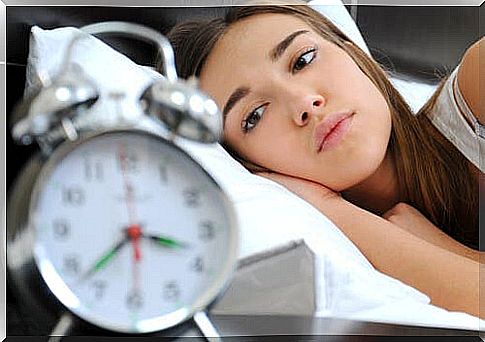What Is The Relationship Between The Menstrual Cycle And Sleep?

The variation in the amount of female hormones regulates the menstrual cycle and has effects on sleep. Before ovulation, there is an increase in estradiol synthesis, which has been linked to increased REM sleep.
After ovulation, progesterone synthesis increases, causing the feeling of drowsiness that many women experience during this period of the cycle.
Hormonal behavior, quality and quantity of sleep vary according to the period of the menstrual cycle in which the woman is. We will separately study each part of the menstrual cycle and its relationship to sleep below.
premenstrual period and sleep
At this stage of the menstrual cycle, sleep is affected by the consequences of increased estradiol synthesis, which has several emotional effects.
It interacts with several brain regions, such as the medulla, hypothalamus, prefrontal lobe, and amygdala, and is responsible for many of the effects on a woman’s emotional universe during the premenstrual phase of the cycle.
These are the symptoms we can notice right before menstruation, when estradiol levels are high:
- Irritability
- Mood changes
- Sadness
- Anxiety
- Social isolation
- Depression
- Insomnia

Sleep disturbances that occur in this phase are usually attributed to increased levels of cortisol and adrenaline, which are the stress generators.
Stress affects sleep in different ways. During this period, the woman may have difficulty falling asleep, waking up all night or waking up tired.
It is convenient, in the premenstrual period, to do activities that contribute to stress management, such as yoga and meditation, which tend to improve the quantity and quality of sleep.
The menstrual cycle and sleep
During the menstrual period, estradiol levels decrease and progesterone levels increase. A decrease in the level of estradiol normally normalizes the sleep-wake rhythm, although in the case of underlying illnesses such as depression and anxiety, sleep disturbances may persist.
Progesterone begins to be synthesized at the time of ovulation and is responsible for preparing the endometrium to receive the future embryo and maintain the pregnancy, if it occurs.
During this period, progesterone causes hormonal changes that can affect sleep. It is responsible for the synthesis of gamma-aminobutyric acid (GABA), which has several antagonistic effects to estradiol.

It modulates impatience, mood swings, reduces distress and improves stress management. Some authors consider progesterone a natural anxiolytic.
- Decreases anxiety.
- Relieves symptoms of depression.
- Improves emotional state.
- Reduces stress.
- Causes drowsiness.
Together, these effects explain the improvement in the sleep-wake rhythm and the increase in the quantity and quality of sleep after menstruation, although there may be factors that alter it as a consequence of headaches, gastric and digestive discomfort, etc.
Anyway, we must observe the menstrual cycle and sleep to detect the changes that occur every 28 days.
Measures to sleep better
- Do not consume exciting substances in the afternoon or evening, such as chocolate, coffee, tea, alcohol and tobacco.
- Have a light dinner and wait at least two hours before going to bed.
- Do light physical exercise, avoiding the last hours of the day, as the opposite effect is achieved.
- Do not take long naps that alter your sleep or wakefulness. Maximum 30 minutes.
- Keep regular sleeping and waking times. Regularity is also important at meal times.
- Avoid exposure to bright light and extreme temperatures in the room.
- Tasks that require mental activity should not be performed in the bedroom, such as using a computer, tablet, cell phone, TV, etc.
- Before bed, you can listen to relaxing music, take a hot bath, or meditate.
As we’ve seen, female hormones vary throughout the menstrual cycle and have several effects on sleep. It is good to know the relationship of different hormones with the menstrual cycle and sleep, in order to take measures to improve its quality, rest and general well-being.









